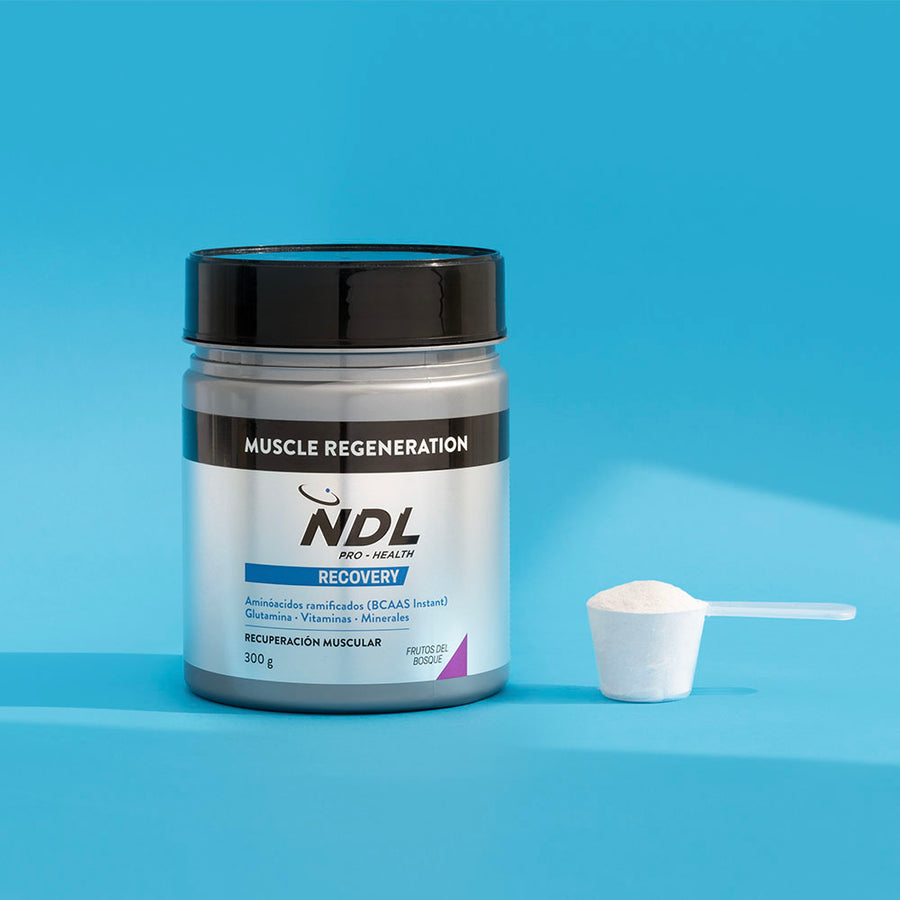Featured Products

Muscle Regeneration
See productGlutamine is one of the most abundant amino acids in the human body and plays a key role in numerous physiological processes. Although the body can naturally produce it, in situations of intense physical stress – such as demanding workouts, injuries, or illness – the demand may exceed the body’s endogenous synthesis capacity.
This article explains what glutamine is, what it is used for, and when its supplementation may be beneficial.
What is glutamine?
Glutamine is a non-essential amino acid, meaning the body can produce it under normal conditions. However, during high physiological demand – such as intense exercise, stress, or illness – it becomes “conditionally essential,” as the body may require additional intake.
It is found in large quantities in muscle tissue and blood and is involved in key functions such as nitrogen transport, protein synthesis, and maintaining acid-base balance. It also serves as an important energy source for immune system cells and those in the intestinal tract.
Among its forms, L-glutamine is the biologically active one and is commonly used in nutritional supplements.
What is glutamine used for?
Glutamine serves multiple essential functions in the body, especially in situations of high physical or metabolic stress. Its main benefits include:
- Muscle recovery and prevention of catabolism: During intense exercise, glutamine levels in muscles can drop significantly. Supplementation may promote protein synthesis, reduce muscle breakdown, and speed up post-workout recovery.
- Immune system support: Glutamine is a key energy source for lymphocytes and other immune cells. Maintaining adequate levels helps preserve immune function, especially in athletes or individuals exposed to prolonged physical stress.
- Gut health: Cells in the small intestine use glutamine as their primary energy source. It supports intestinal mucosa integrity, improves nutrient absorption, and protects against intestinal permeability.
- Support during clinical or extreme physical stress: In cases of surgery, burns, infections, or severe illnesses, glutamine requirements increase. Therefore, it is also used in clinical settings as part of nutritional support under medical supervision.
In summary, glutamine can be a helpful ally for recovery, immunity, and digestive health, both for athletes and for those exposed to high levels of physical exertion.
Who can benefit from glutamine?
Although the body produces glutamine naturally, certain groups may benefit from supplementation, particularly when their needs exceed endogenous production:
- Strength and endurance athletes: Athletes training at high intensity or frequency may experience a drop in glutamine levels, affecting recovery and immune response. Supplementation may help improve performance and reduce the risk of overtraining.
- People under prolonged physical or mental stress: Chronic stress – whether physical (such as surgery or injury) or mental – can deplete glutamine reserves. In such cases, supplementation can help maintain metabolic balance and overall well-being.
- Individuals with digestive disorders: People with intestinal permeability, irritable bowel syndrome, or other gastrointestinal issues may benefit from glutamine due to its role in regenerating the intestinal lining and protecting the mucosal barrier.
- People on very low-protein or strict vegan diets: Since many glutamine sources come from protein-rich foods, those on restrictive diets may consider supplementation – especially if experiencing muscle fatigue, lowered immunity, or digestive issues.
In all cases, it's advisable to adjust the dose to individual needs and consult a healthcare professional before starting supplementation.

How and when to take glutamine
Glutamine is available in various forms, with L-glutamine powder being the most common due to its easy dissolution and absorption. It is also available in capsules or combined with other supplements in post-workout or recovery formulas.
Recommended dosage: The typical dose ranges from 5 to 10 grams per day, depending on the goal and physical demand. Higher doses may be used in clinical settings or under medical supervision.
When to take it:
- After training: Helps with muscle recovery and replenishes glutamine levels in muscle tissue.
- On an empty stomach or before bed: In individuals with high demand, it may help with gut balance and overnight recovery.
- Split doses: In cases of greater need, the daily amount can be divided into 2–3 servings.
Combining with other supplements: Glutamine can be taken alongside BCAAs, proteins, or carbohydrates without interference. Combining it with zinc, probiotics, or B vitamins may enhance its immune or digestive benefits.
As always, intake should be tailored to personal needs, and medical advice is recommended for prolonged or therapeutic use.
Are there any side effects?
Glutamine is generally a safe and well-tolerated supplement when taken at recommended doses. As it is naturally produced by the body, it rarely causes adverse effects in healthy individuals.
Possible side effects:
- At very high doses (over 20–30 g/day), some individuals may experience digestive discomfort such as bloating, gas, or stomach upset.
- Isolated cases of headaches or mild sleep disturbances have also been reported, though these are uncommon.
Contraindications:
- People with liver or kidney diseases should consult a healthcare provider before taking glutamine.
- In cases of cancer treatment or serious health conditions, usage should be evaluated under medical supervision.
In summary, glutamine is safe for most active individuals, but like any supplement, it should be used mindfully, with appropriate dosage and consideration of individual health status.
In conclusion, glutamine is a key amino acid for proper body function, especially under conditions of high demand such as intense training, physical stress, or digestive disorders. Its role in muscle recovery, immune support, and gut health makes it a versatile ally for both athletes and those with specific needs.
Although the body can produce it naturally, supplementation in certain situations can make a difference in performance, well-being, and recovery. Its use should always be tailored to the individual and, if needed, discussed with a healthcare professional.

From the NDL Pro-Health team we will provide you with tips to maintain a healthy lifestyle. Sharing knowledge and product recommendations to offer optimal solutions for your daily routine, for your workouts and subsequent recovery, all with the goal of helping you achieve physical and mental wellness.

















